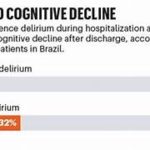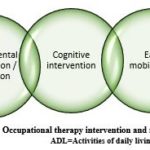Contributed by Shawniqua Williams Roberson, M.Eng., M.D., Departments of Neurology and Biomedical Engineering, Vanderbilt University Medical Center, Nashville, TN. Dr. Williams is a graduate of the 2019 NIDUS Bootcamp. Many of us are familiar with the feeling of not getting enough sleep. Perhaps a storm rattled the windows all night, or the baby couldn’t stop crying. […]
Tag Archives: Delirium
Delirium, Dementia, and Adverse Outcomes
Contributed by Thiago J. Avelino-Silva, MD, PhD*; Flávia B. Garcez, MD, PhD* *Faculty of Medicine, University of São Paulo, São Paulo, Brazil Delirium results from an intricate combination of dozens of possible predisposing and precipitating factors1. Older age, functional dependence, and preexisting cognitive impairment are key determinants for its occurrence, but the latter is a […]
Occupational Therapy: Strategies for Delirium Management
Contributed by Evelyn Alvarez1,2,3 & Juan Pablo Saa4 1 Centro de Estudios en Neurociencia Humana y Neuropsicología, Facultad de Psicología, Universidad Diego Portales, Chile, 2 Facultad de Ciencias de la Salud, Universidad Central de Chile, Chile, 3 Departamento de Terapia Ocupacional y Ciencia de la Ocupación, Facultad de Medicina, Universidad de Chile, Chile, 4 Florey […]
Life Changing: Early Delirium Identification and Intervention
Contributed by Kimberly Oosterhouse, PhD, RN, CNE, Loyola University Chicago, NIDUS Pilot Grant Awardee “Kim, I think this is it; she is not responding to me. Can you please come and be with us?” These are the words I woke up to one morning 16 years ago. My distraught grandfather called me from the inpatient […]
Delirium Research Hub Spotlight – Miles Berger, MD, PhD
Every other month, the Delirium Research Hub selects an investigator and research study included in the Delirium Research Hub to feature as a Spotlight Investigator. This month, we are featuring Dr. Miles Berger, MD, PhD for his study “Markers of Alzheimer’s Disease and Cognitive Outcomes after Perioperative Care (MADCO-PC).” This study investigates whether changes in […]
Delirium Research Profile: Sangil Lee, MD
Hi everyone, My name is Sangil Lee, and I am currently working at the University of Iowa Carver College of Medicine as a clinical associate professor. Tell us how you got started in delirium research. My passion for clinical research has been with me since I became a physician in 2005, when […]
Delirium severity: how do (or should) we conceptualise and measure it?
Contributed by Zoë Tieges, PhD, Psychology Research Fellow, Geriatric Medicine, Usher Institute, The University of Edinburgh Severity grading of delirium in research and clinical practice may have important value in monitoring clinical course and recovery, in providing prognostic information for risk stratification, in informing treatment, and as endpoints in clinical trials. Fine-grained measures of delirium […]
New Systematic Review of Instruments for Identification of Delirium
Contributed by Benjamin K. I. Helfand, MSc, MD/PhD (candidate), University of Massachusetts Medical School Delirium affects approximately 3 million older Americans annually, accounting for over $164 billion in healthcare expenditures.1 Delirium disproportionately affects our older population (over age 65) with major public health implications. Development of delirium is associated with prolonged hospitalization, cognitive decline, and […]
Delirium and the Power of Storytelling
Contributed by Heidi Lindroth, PhD RN, T32 Postdoctoral Fellow, Indiana University School of Medicine, Division of Pulmonary and Critical Care Medicine, Center for Health Innovation and Implementation Science The COVID-19 pandemic has brought the terror of delirium to the forefront. Featured articles in the New York Times, the Atlantic, and others, have highlighted the enormous […]
Brain Basis of Post-Stroke Delirium
Contributed by Roberta Esteves Vieira de Castro, MD, PhD, Rio de Janeiro State University, D’Or Institute for Research and Education, Latin American Delirium Special Interest Group, Rio de Janeiro, Brazil Delirium is a frequent and malignant aggravation succeeding stroke1,2, with an estimated occurrence ranging from 2 to 66%3,4. It may be a direct consequence of […]







